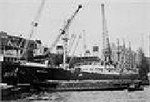The HMS Exmouth was the Royal Navy E-class destroyer. She was ordered on the 1st November 1932 from the Portsmouth Dockyard (Portsmouth, U.K.),Fairfield Shipbuilding Engineering Co., Govan in Scotland. Laid down on the 16th May 1933 and launched on the 7th February 1934. Her servicing started on the the 3rd October 1934.The Pennant H02. The loss position - 58° 18'N, 2° 25'W
Displacement: 1,495 long tons (1,519 t) (standard) 2,050 long tons (2,082.9 t) (deep)
Length: 343 ft (104.5 m) o/a
Beam: 33 ft 9 in (10.3 m)
Draught: 12 ft 6 in (3.8 m)
Installed power: 38,000 shp (28,000 kW)
Propulsion: 2 × shafts, 2 × Parsons geared steam turbines 3 × Admiralty 3-drum boilers
Speed: 36 knots (67 km/h; 41 mph)
Range: 6,350 nmi (11,760 km; 7,310 mi) at 15 knots (28 km/h; 17 mph)
Complement: 175.
Sensors andprocessing systems: ASDIC
Armament: 5 × 4.7 in (120 mm) Mark IX guns, 2 × 4 - QF 0.5 in (12.7 mm) Vickers Mark III anti-aircraft machine guns , 2 × 4 - 21 in (533 mm) torpedo tubes,
20 × depth charges, 1 rail and 2 throwers.





The U-22 was built as a type IIB submarine in 1936 by the Germaniawerft AG shipyard in Köln.
Displacement 279 t (275 long tons) surfaced, 328 t (323 long tons) submerged, 414 t (407 long tons) total.
Length: 42.70 m
Beam: 4.08 m
Draught: 3.9 m
Propulsion: Diesel-Electric
Cruise Speed: 8 knots.
Max. Speed: 13 knots (24 km/h; 15 mph) surfaced, 7 knots (13 km/h; 8.1 mph) submerged.
Armament/Other: 3 bow tubes, 0 stern tubes, 5 torpedos or 12 TMA, various 20mm (0.79 in) anti-aircraft gun.
Max depth: 150m, 492ft
Range: 3,100 nmi (5,700 km; 3,600 mi) at 8 kn (15 km/h) surfaced, 35–43 nmi (65–80 km; 40–49 mi) at 4 kn (7.4 km/h) submerged.
Crew: 22-24.

Displacement: 1,495 long tons (1,519 t) (standard) 2,050 long tons (2,082.9 t) (deep)
Length: 343 ft (104.5 m) o/a
Beam: 33 ft 9 in (10.3 m)
Draught: 12 ft 6 in (3.8 m)
Installed power: 38,000 shp (28,000 kW)
Propulsion: 2 × shafts, 2 × Parsons geared steam turbines 3 × Admiralty 3-drum boilers
Speed: 36 knots (67 km/h; 41 mph)
Range: 6,350 nmi (11,760 km; 7,310 mi) at 15 knots (28 km/h; 17 mph)
Complement: 175.
Sensors andprocessing systems: ASDIC
Armament: 5 × 4.7 in (120 mm) Mark IX guns, 2 × 4 - QF 0.5 in (12.7 mm) Vickers Mark III anti-aircraft machine guns , 2 × 4 - 21 in (533 mm) torpedo tubes,
20 × depth charges, 1 rail and 2 throwers.
The U-22 was built as a type IIB submarine in 1936 by the Germaniawerft AG shipyard in Köln.
Displacement 279 t (275 long tons) surfaced, 328 t (323 long tons) submerged, 414 t (407 long tons) total.
Length: 42.70 m
Beam: 4.08 m
Draught: 3.9 m
Propulsion: Diesel-Electric
Cruise Speed: 8 knots.
Max. Speed: 13 knots (24 km/h; 15 mph) surfaced, 7 knots (13 km/h; 8.1 mph) submerged.
Armament/Other: 3 bow tubes, 0 stern tubes, 5 torpedos or 12 TMA, various 20mm (0.79 in) anti-aircraft gun.
Max depth: 150m, 492ft
Range: 3,100 nmi (5,700 km; 3,600 mi) at 8 kn (15 km/h) surfaced, 35–43 nmi (65–80 km; 40–49 mi) at 4 kn (7.4 km/h) submerged.
Crew: 22-24.
Last edited:


